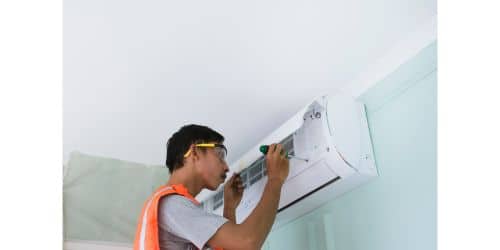You understand the value of providing great service and guaranteeing customer satisfaction as an HVAC contractor. However, it is equally important to safeguard your company against potential risks and liabilities. This is where HVAC contractor insurance can help. In this complete article, we will look at HVAC contractor insurance coverage, cost, the application procedure, and State Farm as a major provider. Let’s look at how getting the correct insurance coverage can protect your company and provide you with peace of mind.
What is HVAC Contractor Insurance?
HVAC contractor insurance is a type of specialized insurance that protects HVAC experts and their businesses from potential risks and liabilities associated with their jobs. It protects against property damage, bodily injury, and other accidents that may occur during HVAC installation, repair, or maintenance.
Importance of HVAC Contractor Insurance
HVAC contractor insurance is required for various reasons. For starters, it protects your company’s assets and finances in the event of an accident, property damage, or injury at work. Second, it helps to build trust and confidence with clients by ensuring that you are sufficiently covered if something goes wrong. Finally, before employing or subcontracting HVAC services, many clients and general contractors may need proof of insurance.
HVAC Contractor Insurance Coverage
HVAC contractor insurance is an important part of safeguarding your company from any hazards and liabilities. Let’s take a look at the main forms of coverage that are commonly included in HVAC contractor insurance policies:
#1. General Liability Insurance
General liability insurance is a must-have for HVAC contractors. It guards against third-party claims for bodily injury, property damage, or advertising injuries. For example, if a customer slips and falls on your job site and sustains an injury, general liability insurance would cover their medical bills as well as any legal fees if a lawsuit arises.
#2. Commercial Property Insurance
Commercial property insurance protects your company’s assets, such as its office, equipment, tools, and inventory. It covers damages caused by fire, theft, vandalism, or other insured dangers. Commercial property insurance can help cover the cost of repair or replacement if your HVAC equipment is destroyed or stolen.
#3. Professional Liability Insurance
HVAC contractors who provide design, consultation, or expert advice must have professional liability insurance, often known as errors and omissions (E&O) insurance. It safeguards your professional services from claims of negligence, errors, or omissions. For example, if a bad HVAC installation causes a client to suffer property damage or financial loss, professional liability insurance can help pay the resulting damages and legal expenses.
#4. Workers’ Compensation Insurance
If you have employees, you must obtain workers’ compensation insurance. It covers medical bills, disability benefits, and lost wages if an employee is injured or ill while performing job tasks. Workers’ compensation insurance protects your company from potential litigation by ensuring that your employees are adequately compensated.
#5. Commercial Auto Insurance
Commercial auto insurance is required if your HVAC company uses automobiles for transportation or service calls. It provides coverage for accidents, property damage, and bodily injury caused by commercial vehicles. Commercial auto insurance protects you on the road, whether it’s a company van or a personal vehicle used for work.
HVAC Contractor Insurance Cost
HVAC contractor insurance can be as low as $50 per month, but the exact cost will depend on your circumstances and needs.
Factors Affecting HVAC Contractor Insurance Cost
HVAC contractor insurance costs vary depending on several criteria. The following are some important elements that can affect the cost of your insurance coverage:
- Business Size and Revenue: The size and annual revenue of your HVAC contracting firm might have an impact on your insurance costs. Larger companies with bigger sales may face higher insurance costs as a result of increased exposure and potential claims.
- Location: The geographic location of your firm can influence insurance pricing. Local regulations, weather-related risks, and regional claim trends can all have an impact on rates.
- Coverage Limits: The coverage limits you select for your HVAC contractor insurance policy will have an immediate influence on the cost. Higher coverage limits give more comprehensive coverage but may result in higher premiums.
- Coverage Types: The precise types of coverage you choose for your HVAC contractor insurance will influence the overall cost. HVAC contractors typically carry general liability insurance, professional liability insurance, workers’ compensation insurance, and commercial property insurance. The higher the total cost, the more coverage types you include.
- Deductibles: A deductible is an amount you must pay out of pocket before your insurance coverage kicks in. Higher deductibles can cut your premiums but require you to pay more if you file a claim.
- Claims History: Your claim history can affect the cost of your insurance. Insurers may consider your firm to be more risky if you have a history of frequent or major claims, leading to higher premiums.
- Risk Management Practices: Demonstrating effective risk management practices, such as instituting safety standards, employee training programs, and having a clean claims history, may result in cheaper insurance premiums. Businesses that aggressively manage risks are frequently rewarded by insurers.
State Farm HVAC Insurance
State Farm is a well-known insurance provider that provides a variety of insurance products, including HVAC contractor coverage alternatives. While State Farm is best known for auto and home insurance, they also provide commercial insurance options suited to small businesses, including HVAC contractors.
State Farm’s HVAC insurance coverage typically includes the following:
#1. General Liability Insurance:
This coverage protects HVAC contractors from third-party bodily injury, property damage, and personal injury claims. It assists in covering medical expenditures, legal fees, and losses incurred as a result of accidents or incidents that occur during your HVAC operations.
#2. Commercial Property Insurance:
State Farm insures your commercial property, including HVAC equipment, tools, and inventory. It safeguards against hazards such as fire, theft, vandalism, and natural disasters. Commercial property insurance can help cover the cost of repair or replacement if your equipment is damaged or stolen.
#3. Business Interruption Insurance:
If your HVAC business operations are disrupted due to covered perils, this coverage protects your income and covers certain ongoing expenses. It can assist in compensating for lost income during the restoration period following a covered event, such as a fire or natural disaster.
#4. Equipment Breakdown Insurance:
State Farm provides coverage for HVAC equipment breakdowns such as furnaces, air conditioning units, and boilers. This coverage helps the cost of repairing or replacing damaged equipment, as well as any resulting business losses as a result of the breakdown.
#5. Commercial Auto Insurance:
If your HVAC company employs vehicles for transportation or service calls, State Farm’s commercial auto insurance can cover accidents, property damage, and bodily injury caused by commercial vehicles.
It’s important to note that State Farm’s insurance options may differ depending on your location and specific business requirements. It is best to contact a State Farm agent who can provide personalized information and guidance based on your specific circumstances to determine the exact coverage options, limits, and costs available to you as an HVAC contractor.
When considering insurance providers, it’s always recommended to compare quotes, coverage options, and customer reviews from multiple insurers to ensure you’re getting the most suitable coverage at a competitive price.
HVAC Contractor Insurance Application
Typically, the HVAC contractor insurance application process entails providing detailed information about your business operations, risks, and coverage requirements. While each insurance provider’s criteria may differ, the following are some common actions to take while applying for HVAC contractor insurance:
#1. Gather Business Information:
Collect crucial information about your HVAC contracting business, such as its legal name, address, contact details, and the number of years you have been in operation.
#2. Description of Operations:
Provide a full explanation of your HVAC business operations, including the types of services you offer, such as installs, repairs, maintenance, or design consultations. Be explicit about the HVAC systems you operate with (e.g., residential, commercial, industrial) and any specialty services you provide.
#3. Employee Details:
If you have employees, you will need to give information about the number of employees, their roles, and their respective credentials and experience. This helps the insurer understand the workforce and estimate the associated risks.
#4. Claims History:
Provide facts about any previous insurance claims relating to your HVAC business. This provides information about the nature of the claims, the sums paid, and the dates of the incidents. A claims history helps insurers estimate the potential risks and calculate the appropriate coverage and premiums.
#5. Safety and Risk Management:
Outline any safety measures, risk management techniques, or employee training programs you have undertaken to mitigate potential dangers. This information shows your dedication to maintaining a safe work environment and can potentially affect your insurance premiums.
#6. Desired Coverage:
Indicate the specific types of coverage you require, such as general liability insurance, professional liability insurance, workers’ compensation insurance, commercial property insurance, and commercial auto insurance. Indicate the coverage limits desired for each form of insurance.
#7. Additional Documentation:
You may be required to provide extra evidence, such as financial statements, licences, certificates, proof of bonding, or any specific industry-related certifications (e.g., HVAC licences), depending on the insurer’s requirements.
#8. Consult with an Insurance Agent:
Working with a seasoned insurance agent who specializes in HVAC contractor insurance might help expedite the application process. An agent can help you navigate the application, obtain the relevant information, and ensure that you provide all of the necessary details appropriately. It’s vital to remember that each insurance company has its own unique application process and standards.
Why is commercial HVAC so expensive?
Commercial HVAC systems are more expensive than residential HVAC systems, and not just because they are larger. There are various reasons why commercial HVAC is more expensive. First, commercial buildings require a higher degree of care, which means they must be inspected and maintained more frequently.
Are HVAC labor warranties worth it?
If you know that fixing or replacing your HVAC system will cost you a lot of money, it’s a good idea to get an extended warranty. Even if you never use it, it is far preferable to having to put a significant repair or replacement expense on your credit card.
What is the failure rate of HVAC businesses?
Every year, around 20% of HVAC contractors fail in the sector, with 70% of new HVAC businesses failing in their first year of operation.
What is the average markup on HVAC?
In general, the best markup for HVAC parts and materials is between 3X and 6X what you paid for the item.
What is the average lifespan of a commercial HVAC unit?
15 to 20 years
The average life expectancy of commercial HVAC systems is 15 to 20 years, assuming recommended maintenance is followed.
Are HVAC quotes negotiable?
Yes, HVAC quotes can be negotiable to some extent. A quote from an HVAC contractor is often based on numerous factors, such as the scope of work, equipment costs, labor expenditures, and any additional services or materials needed.
Is a 10-year labor warranty worth it for HVAC?
The truth is that you probably don’t need an extended warranty on an HVAC system if you’re ready to invest the money upfront in a decent brand installed by a good contractor. HVAC equipment is fairly durable, so the chances of it malfunctioning before the typical 10-year warranty expires are slim.
What is the profit margin for HVAC contractors?
According to Contracting Business, the industry as a whole has a profit margin of 2.5–3.5%. Nonetheless, effective HVAC businesses can significantly improve on that figure, with 10% for companies that do well and 25% for companies that do well.
What should an HVAC estimate include?
Your consumers should be informed of where their money is going or what they are paying for with your air conditioning repair service based on your estimate. The summary must include thorough information about the problem, how it will be remedied, and how long the project will take to complete.
Conclusion
Getting HVAC contractor insurance is an important step in protecting your company, assets, and income. You can guarantee that you have comprehensive protection against potential risks and liabilities by understanding the many types of coverage available, assessing your specific needs, and engaging with trustworthy insurance providers like State Farm.
Remember that the cost of insurance is a good investment when weighed against the potential financial consequences of an uninsured incident. You may maximize your insurance cost while providing the required protection for your HVAC contracting firm by taking proactive actions to mitigate hazards, maintain a positive claims history, and routinely review and update your policy.
Don’t underestimate the significance of HVAC contractor insurance. Take the time to research your alternatives, talk with insurance professionals, and make informed decisions to protect your company’s brand, financial stability, and reputation. With the proper insurance coverage in place, you can focus on providing outstanding HVAC services to your consumers while being worry-free.
- General Contractor Insurance: Coverage, Cost & More
- BUSINESS INSURANCE FOR CONTRACTORS: Cost, Requirements & Best Services
- Cheap Small Business Insurance: Best of 2023
- EQUIPMENT INSURANCE: What Is It & What Does It Cover?
- PHYSICIANS DISABILITY INSURANCE: The Complete Guide






